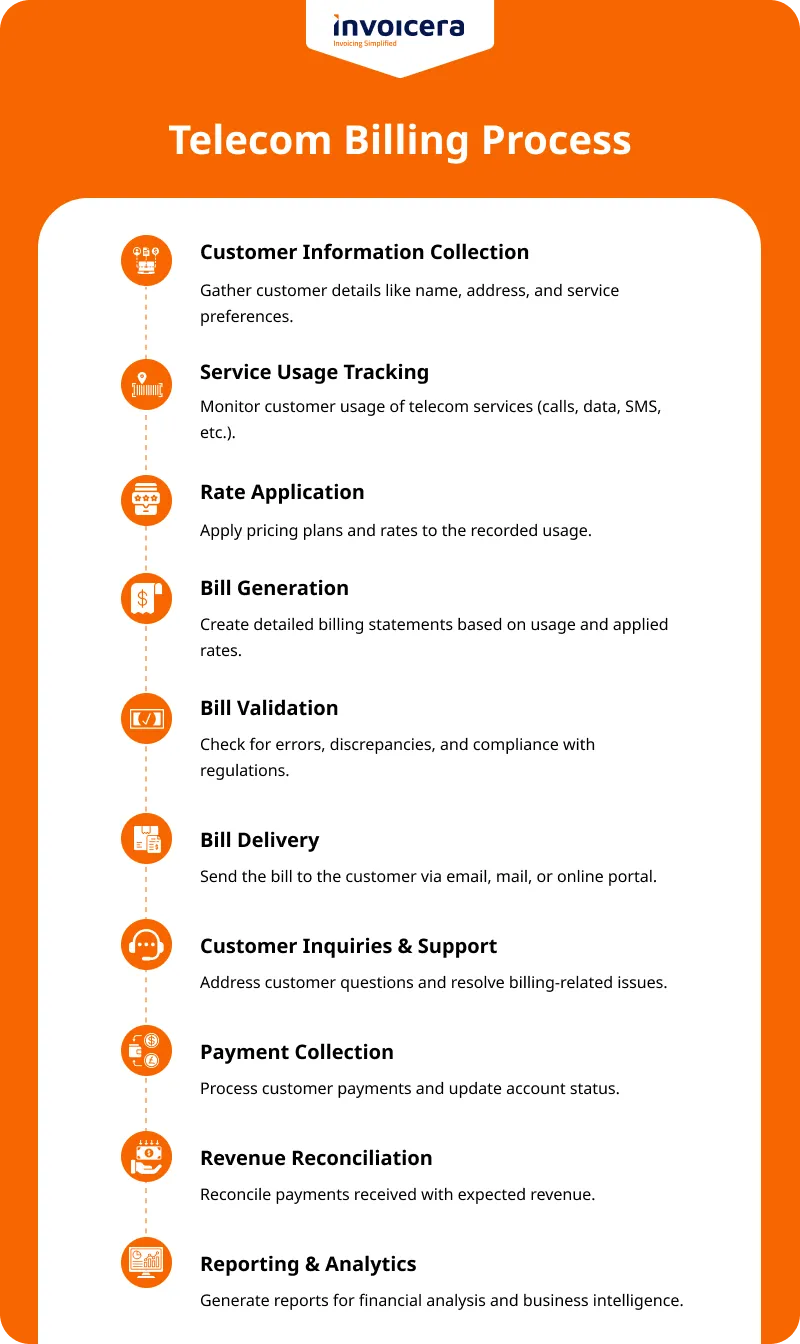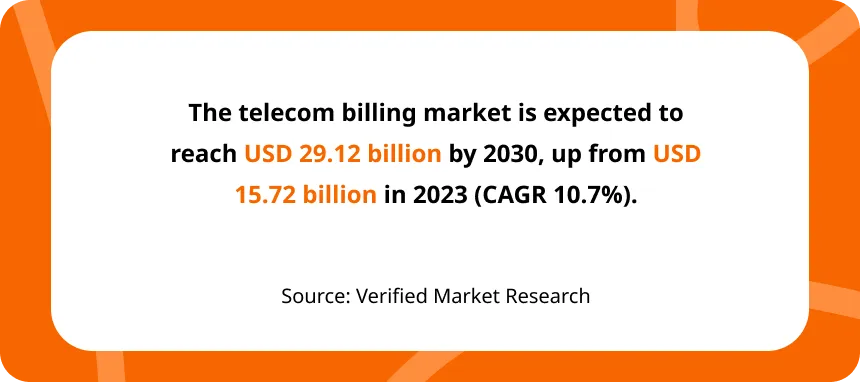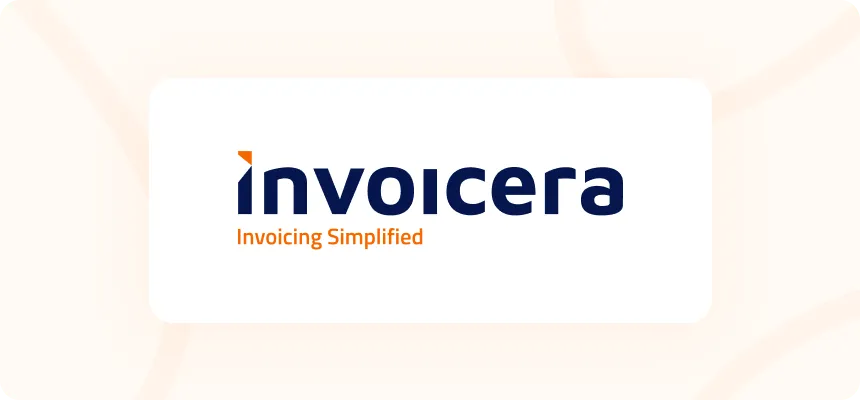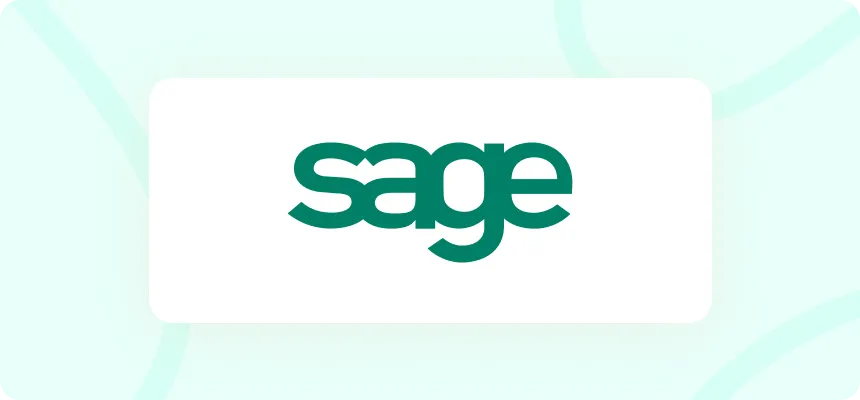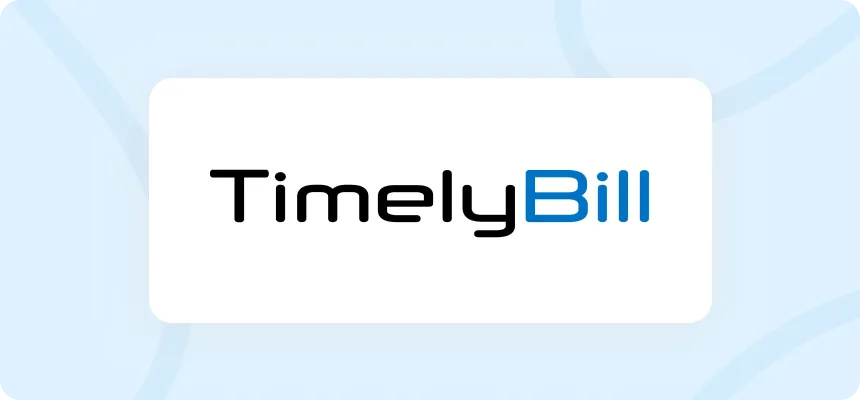Introduction
Telecom companies face a big problem: dealing with billing and cash flow. With numerous customers and various service types, billing mistakes are bound to happen.
A study by Ovum tells that telecom companies annually lose 2% of their revenue because of billing mistakes.
Those are billions of dollars falling through our fingers.
This is an immense challenge, not just because it is the source of revenue loss but also a lack of customers’ trust.
In this blog, we will consider the top telecom billing systems and revenue solutions that solve these problems so that the companies don’t face any issues. We will discuss tools for streamlining billing, improving accuracy, and enhancing customer satisfaction.
Let’s take a closer look to understand how these tools turn the process of telecom revenue management into a completely different thing.
What Is Telecom Billing?
Telecommunications billing system involves calculating, making, and managing invoices for the services that telecom companies offer to their customers.
It’s a complicated process that involves various parts, such as customer subscriptions, tracking usage, pricing plans, and collecting payments.
The key thing that sets telecom billing apart from other billing systems is how complex and data-heavy it is to gather real-time usage details and turn them into billable charges.
Communication Service Providers (CSPs) use advanced cloud-based software solutions to automate as much telecom billing as possible.
However, with new 5G billing technology being rolled out and 6G on the horizon, what is considered cutting-edge today may soon be outdated.
So, telecom companies are focusing on setting up billing systems that can grow and adapt quickly, using cloud-based operations and business systems built to last.
Importance Of Robust Telecom Billing Solutions
- Correct Billing: Telecom billing solutions ensure the customer is billed the proper amount. These solutions match the billing records with the network usage data; therefore, the service providers can charge the customers for their actual usage. This cross-checking process ensures that customers are not overcharged or undercharged.
- Fewer Billing Mistakes: Telecom billing solutions are a great way to eliminate billing mistakes. Manually created bills will likely have errors, which could be costly for the service provider and customers. By automating the billing process, these solutions reduce the chances of mistakes. Thus, the customer experience is improved, resulting in better cash flow.
- Clear Billing Information: Telecom billing solutions give customers detailed billing data and usage details. This degree of openness enables the detection and quick fixing of billing problems. The customers can quickly grasp their bills, which results in their trust and satisfaction with the service provider’s billing practices.
- Better Decision Making: These solutions provide reliable data and insights to the management teams. Hence, they can make informed budgeting, forecasting, and profitability analysis decisions. Through data analysis, the service providers can increase their revenue streams and, at the same time, improve the overall profitability of the business, ensuring long-term success.
- Efficient Billing Management: Telecom billing solutions make the billing process more efficient, thus saving service providers time and resources. Automated tasks help cut down the manual work related to billing operations, boosting efficiency and lowering costs for the company.
- Ability to Grow: As a business expands, telecom billing solutions can change to accommodate the rising number of customers and usage without any problems. This ability to grow thus ensures long-term sustainability and allows service providers to continue revenue growth without being hampered by it.
Challenges In Managing Telecom Billing
- Complex Systems Integration: Telecom billing integrates several systems, such as customer management, billing platforms, and payment gateways. It is not easy to make all these systems work together seamlessly. Nevertheless, a solid billing system like Invoicera will make this process easier and more automated. It offers real-time analytics and easy integration with other systems; thus, you get quick insights into billing, which helps you make better choices.
- Hidden Costs in Telecom Billing: Handling many bills and costs can be too much for billing managers at mid-sized telecom firms. Manual invoice processing is the cause of errors, and every error costs money. To prevent these hidden charges, you can run automated checks to spot the hidden costs.
- Telecom Billing Data Security Issues: Telecom companies control vast customer data. At the same time, they have to protect that data from being breached or stolen. Advanced telecom billing software systems like Invoicera can solve this problem by providing the best security measures to protect customer information and build trust. These software systems are developed to handle, analyze, and store substantial customer data while following the data privacy rules.
- Late Payments in Telecom Billing: In the telecom industry, on-time bill sending is crucial for maintaining cash flow. Late bills are a major cause of liquidity problems. Software that sends bills before the due date gives customers enough time to pay, thus preventing surprise payments.
- Ensuring Accuracy in Telecom Subscription Billing: Accuracy is essential in telecom subscription billing. Manual billing processes can lead to mistakes, disputes, and unhappy customers. Switching to automated billing systems can solve this problem. Invoicera’s technology is designed to avoid errors and streamline billing, maintaining data accuracy. Automated billing and leveraging usage data allow telecom companies to improve their services and make better decisions.
- Ensuring Regulatory Compliance in Telecom Billing: Adhering to billing regulations is crucial to maintaining a company’s reputation in the telecom industry. Violating these rules can result in substantial fines and damage the company’s image. Telecoms must stay up-to-date with a constantly evolving set of compliance rules as varied as the technology they cover.
Top 8 Telecom Billing Software And Revenue Solutions
1. Invoicera
Invoicera helps telecom businesses manage billing efficiently. It offers different pricing plans and bills based on usage. Invoicera handles many service options and takes care of the entire billing process. It creates invoices automatically and lets customers pay online.
Invoicera also reminds customers about unpaid bills. You can study usage data and pricing trends to improve services. Key features are automated invoicing, online payments, and payment reminders.
Pricing: The basic plan starts at $19 monthly and goes up to $119 for the highest tier.
2. OneBill
OneBill software manages the entire process, from finding new customers to earning revenue. For telecoms, it handles customer management, documents, and robust billing based on usage. OneBill supports one-time, recurring, subscription, and usage-based billing models.
This works well if your telecom business has diverse billing needs. Key features are CRM, document management, and a configurable billing engine.
Pricing: Request a demo or speak to their experts.
3. Zoho
Zoho billing works with mobile, internet, and data plans for telecom companies. Customers can view usage, bills, and payment details themselves. Automated billing reduces mistakes and saves time.
Zoho billing easily connects with other Zoho software like CRM and accounting. Key features are subscription management, a self-service portal, automation, and integration.
Pricing: $15 to $79 per month, plus custom pricing.
4. Sage
Sage Management provides telecom billing solutions for large carriers and government agencies. It combines data from multiple sources for significant mergers and acquisitions. Sage unifies billing across voice, data, and mobile services.
It allows flexibility in billing setup and full usage tracking to improve services. Key features include a unified platform, billing flexibility, usage monitoring, and revenue insights.
Pricing: $58.92 to $160+ per month based on number of users.
5. Chargebee
With Chargebee, you can charge customers based on how much product or service they use. You can set these usage-based charges as plans or add-ons.
Chargebee lets you automatically create and close unpaid invoices. Or you can do it manually.
This platform makes metered billing easy for usage-based pricing models. Metered/usage-based billing, flexible pricing components, and automated invoicing are vital features.
Pricing: Free starter plan, $599 monthly for a higher tier, custom pricing for enterprises.
6. TimelyBill
TimelyBill is an all-in-one billing system for telecom, wireless, VoIP, and IoT providers. This secure cloud platform lets telecoms manage customer accounts, activations, and usage ratings. TimelyBill automates subscription and recurring payment billing, helping drive revenue growth. The platform is scalable and easy to use. Unified billing, account management, usage rating, and automation are vital features.
Pricing: TimelyBill shares a pricing presentation explaining their fee structure.
7. ETI
ETI Software offers secure cloud-hosted billing for telecoms. It tracks customer bills, payments, services, and information, which helps resolve billing questions efficiently. The platform includes Microsoft accounting for end-to-end billing and subscriber management. Other features are quote generation, contract management, invoicing, and payment processing. Key capabilities are centralized billing data, integration with accounting, and sales operations support.
Pricing: Available on request.
8. Rev.io
Rev.io provides a secure, flexible telecom/IoT billing platform for managing customer relationships. Their goal is innovative billing with excellent service to help businesses grow and scale. Rev.io offers billing, invoicing, inventory, order management, service provisioning, self-service portals, and more. Key features cover the complete lead-to-cash cycle.
Pricing: Share requirements to get a quote.
9. Togai
Telecom companies prefer Togai for user-friendly payment gateways, accurate billing processes, and flexible pricing models based on data. Togai integrates with existing systems and handles complex hierarchies and usage-based pricing well.
It has robust security features like tokenization and data access controls. Key strengths are UI, integration, data-driven pricing strategies, and security.
Pricing: Fee-based on usage volume for startups; unlimited for enterprises.
10. Aria Solutions
It is a specialized billing software made for the telecom industry. It handles billing and invoicing while recognizing revenue during service delivery. Aria collects data across private, mobile, fixed, metered, and non-metered voice, data, and messaging services.
The software fully automates billing processes and integrates with various other tools. It allows adjusting rates and customizing billing for call minutes and data plans. Aria ensures compliance with telecom regulations. It supports simple to complex revenue recognition models for accurate pre-paid and post-paid service accounting.
Pricing: Not publicly listed; you must request a quote from Aria.
Best Practices For Implementing Telecom Billing Systems
It is not tough to build up your telecom billing system.
- Know What You Need: Define exactly what your business needs from a billing system and then try to get it. Consider its ability to adapt and strive to satisfy your particular demands.
- Work Together: Get everyone together, including finance, IT, and customer service. It is better to keep everyone in the loop for a smoother workflow.
- Move Your Data Carefully: Ensure your data is secure during migration from the old system to the new one. It is essential to ensure everything is accurate and safe.
- Make it Your Own: Opt for a system that can modify billing and invoices. This will allow you to shape the system to meet your specific needs and those of your customers.
- Teach Your Team: Provide the necessary training for your staff on how to use the new system. The whole process is much more efficient when everyone knows their responsibilities.
- Keep Improving: When your system is in full swing, still keep track of it. Search for possibilities to keep improving it later on.
Follow these guidelines; your new billing systems will run successfully in significantly less time.
Future Trends In Telecom Billing Systems
Curious about what’s next for phone bill systems? Here’s what you need to know:
- Going Digital: Telecom billing systems are set to transition towards fully online platforms. This shift promises greater convenience for consumers and will make the processes more accessible for service providers.
- Personalized Plans: Soon, your phone plan could be tailored just for you. You can expect more options and flexibility to fit your needs perfectly.
- Automatic Updates: Manual updates will be a thing of the past. Your phone bill system will start updating itself automatically, so you’re always up to date.
- Intelligent Alerts: In the future, telecom billing systems will be equipped with intelligent alert systems that provide timely notifications about usage spikes, upcoming payments, and other relevant information.
- Better Security: Security is getting tighter. As phone bill systems beef up their security measures and protect you against potential threats, your personal information will be even safer.
Conclusion
Telecom billing systems are experiencing significant change. This change is driven by digital technology, customer customization, and better efficiency.
As discussed, billing mistakes lead to a 2% revenue loss each year. Robust billing solutions are critical. Despite challenges, new innovative telecom billing software can simplify processes, automate tasks, and improve security.
By following best practices and future trends, telecom companies can manage complexities, improve operations, and keep customers happy in a constantly changing business environment.
As we move towards personalized plans, automated updates, and tighter security, the future of telecom billing promises excellent efficiency and a focus on customer needs.
Let’s take advantage of these opportunities and drive the telecom billing industry to new heights.
FAQs
How do telecom billing systems handle international billing and currency conversion?
Most modern telecom billing systems can seamlessly handle international billing and currency conversion. They often have built-in features that support multiple currencies and provide real-time exchange rate updates to ensure accurate billing for international transactions.
Can telecom billing systems integrate with existing business software and tools?
Many telecom billing systems offer integration capabilities, allowing them to sync with various existing business software and tools, such as CRM systems, accounting software, and payment gateways. This integration streamlines operations and ensures data consistency across platforms.
How secure are telecom billing systems in terms of protecting sensitive customer data?
Security is a top priority for telecom billing systems, and reputable providers implement robust measures to safeguard sensitive customer data. This may include encryption protocols, secure storage practices, and compliance with industry regulations such as GDPR and PCI DSS.



